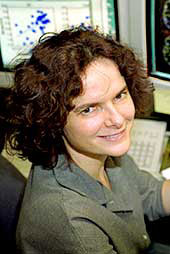 Dr. Nora D. Volkow will become the fifth director of NIDA in May 2003.
Dr. Nora D. Volkow will become the fifth director of NIDA in May 2003.Dr. Nora D. Volkow, a prominent drug abuse researcher who pioneered the use of new imaging technologies to investigate neurochemical functions in the human brain that underpin drug addiction, has been appointed to the post of NIDA Director by Dr. Elias Adam Zerhouni, director of the National Institutes of Health. Dr. Volkow will assume her duties in May 2003. As NIDA's fifth director since the Institute was created in 1974, Dr. Volkow succeeds Dr. Glen R. Hanson, who has served as NIDA's Acting Director since December 2001. Dr. Hanson will resume his professorship in the Department of Pharmacology and Toxicology at the University of Utah and his research on the neurochemical and neurotoxic consequences of psychostimulants. He also will serve as the director of the Utah Addiction Center.
Dr. Volkow comes to NIDA from Brookhaven National Laboratory (BNL) in Upton, New York, where she served for 15 years in a variety of leadership, research, and teaching positions. Among the BNL positions she held concurrently at the time of her NIDA appointment were associate director for life sciences, director of nuclear medicine, and director of the Regional Neuroimaging Center funded by NIDA and the U.S. Department of Energy. The Center has been a world leader in the development of radio-labeled compounds that make it possible to track biochemical activity and see how aging, mental illness, and abused drugs affect the human brain. Dr. Volkow also was associate dean of the School of Medicine and a professor in the Department of Psychiatry at the State University of New York (SUNY)-Stony Brook.
"With Dr. Volkow's appointment to head NIDA, drug abuse researchers, practitioners, and patients have gained a strong leader capable of focusing scientific investigation on the root causes of drug addiction and the factors that influence its progression," said Dr. Zerhouni. "The research, leadership, and communication skills Dr. Volkow exhibited during her tenure at Brookhaven demonstrate her ability to advance NIDA's mission of increasing knowledge about drug addiction that will foster improved prevention and treatment of this destructive disease," he said.
At Brookhaven, Dr. Volkow's research revolved around the concept that drug addiction changes the brain in fundamental and long-lasting ways that promote continued addictive behavior. With support from NIDA, other NIH Institutes, and the Department of Energy, Dr. Volkow used rapidly evolving brain imaging technologies, such as positron emission tomograpy (PET), to investigate the neurochemical mechanisms underlying the addictive and toxic properties of drugs of abuse in the human brain. Dr. Volkow's studies document fundamental changes in the addicted brain, such as decreased functioning of the neuronal system that relies on the neurotransmitter dopamine to modulate moods, pleasurable feelings, and other important functions. These functional impairments in the dopamine system are associated with changes in frontal brain regions that may contribute to the loss of behavioral control that characterizes addiction. Dr. Volkow's findings support a biomedical model of drug addiction that has gained widespread acceptance in recent years: the concept that addiction is a chronic brain disease that should be treated medically.
Dr. Volkow's research also has helped to shed light on underlying neurobiological mechanisms that appear to play a role in individual differences in vulnerability to drug abuse, alcoholism, and other compulsive disorders characterized by loss of behavioral control. Her studies have focused on neurochemical mechanisms responsible for variations in how different individuals respond to drugs of abuse. For example, Dr. Volkow's PET studies indicate that whether individuals have low or high levels of a specific receptor for dopamine in the brain's reward circuits may determine their reaction to dopamine-boosting drugs of abuse and can affect whether or not they are likely to continue to abuse drugs.
Dr. Volkow's work includes more than 275 peer-reviewed publications, three edited books, and more than 50 book chapters and other manuscripts. Her career has been distinguished by numerous awards since she garnered several outstanding scholarship awards as a medical student at the National University of Mexico in Mexico City, where she received her M.D., and at New York University, where she received postdoctoral training in psychiatry.
After a 3-year assistant professorship at the University of Texas Medical School, Dr. Volkow joined BNL as an associate scientist and SUNY-Stony Brook as assistant professor in the Psychiatry Department. Over the ensuing decade and a half, she filled a series of successively more senior administrative, research, and teaching positions, culminating in the leadership posts she currently holds at both institutions. In the last 5 years, Dr. Volkow's work has been honored with awards from the Society of Nuclear Medicine and the American College of Neuropyschopharmacology, among others. In 2000, she was elected to membership in the Institute of Medicine in the National Academy of Sciences.
